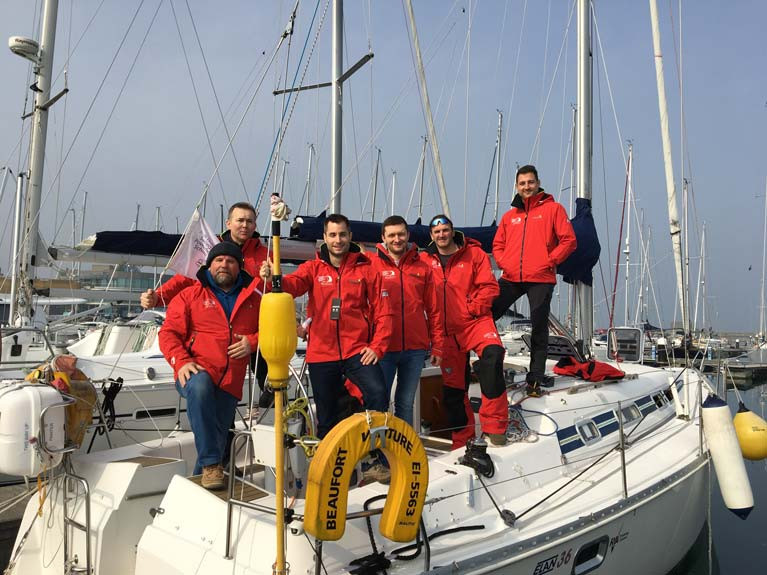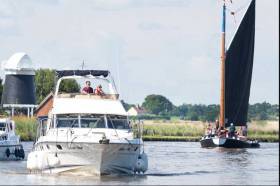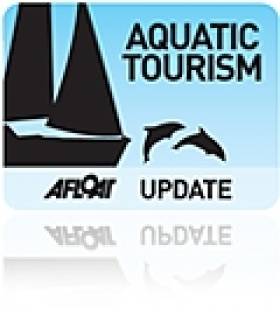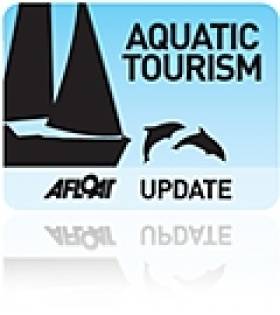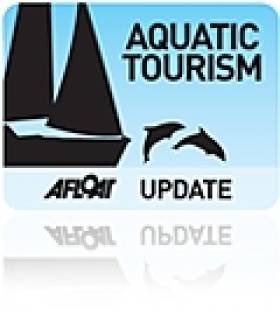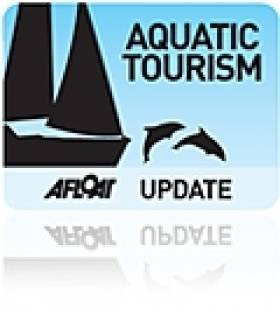Displaying items by tag: aquatic tourism
Renewable Energy Grants for Coastal Businesses under Brexit Adjustment Reserve Funding
Businesses within 10 kilometres of Ireland’s coastline can apply for renewable energy grants worth up to 200,000 euro under the Brexit Blue Economy Enterprise Development Scheme.
Funding of €25 million has been provided from the Brexit Adjustment Reserve (BAR), a one-off payment to Ireland from the EU to compensate for the impact of Brexit.
A variety of sectors may qualify in seafood; coastal tourism; boat building and repair; marine leisure and sport; renewable energy initiatives, and small non-commercial harbour or pier activities.
The scheme is being administered by Bord Iascaigh Mhara (BIM) and delivered through Fisheries Local Action Groups (FLAGs).
BIM regional officer Brenda O’Riordan said the scheme has already received some promising and innovative proposals across a range of blue economy businesses from seafood, coastal tourism, boat building and repair to marine leisure and sport.
“Given spiralling energy costs, we’re seeing a lot of interest from a wide breadth of blue economy businesses across Ireland’s coastal communities, particularly those looking to go green,” she said.
She cited examples ranging from fishmongers putting photo-voltaic units on the roof of the business to supply power and charter boat businesses upgrading their engines to hybrid/electric, to seafood companies looking at lighting, heating and refrigeration upgrades.
“With these grants, blue economy businesses can start to take greater control of their energy costs and become more sustainable by helping to reduce emissions and the impact on our environment,” she said.
The scheme is described as the largest of its kind ever and is open to three streams of projects: capital investment, business mentoring and capacity development, and upskilling and training.
Full details about the Brexit Blue Economy Enterprise Development Scheme, including how to apply, can be found here
A European system of measuring the impact of tourism on communities is to be introduced on a number of islands off the west Irish coast this summer.
Three Aran islands and Inishbofin off Galway, along with Donegal’s Tory and Arranmore, will participate in the project led by researchers from the new Atlantic Technological University (ATU).
The European Tourism Indicator System (ETIS) was developed by the European Commission as an evidence-based model for collecting information and measuring impacts.
It involves collecting data on 43 specific areas, ranging from tourist spending patterns to gender equality, inclusion and accessibility, transport impact, climate change, energy consumption, waste generation and sewage treatment.
The system helps to measure trends over time, such as the rising percentage of women in management roles; changes in waste water quality; reduction in carbon dioxide emissions, and changing impacts of tourism in the community.
The researchers will work with communities, tourism stakeholders and destination managers on gathering the information which will better inform the sustainable management of island tourism, according to ATU president Dr Orla Flynn.
State agencies Fáilte Ireland and Údarás na Gaeltachta, along with local authorities, will also support the project.
Up until now, detailed tourism indicators have been limited, but the ETIS is a very accessible international model, Dr Diarmuid Ó Conghaíle, ATU’s head of department for heritage and tourism, explained.
“While we are starting with the four Galway islands - and Tory and Arranmore with the support of Údarás na Gaeltachta - the aim is to incorporate all offshore islands from about 2024,” he said.
“It will allow the islands to compare their performance on tourism, will inform planning and sustainable management, and may even create a bit of competition, “Ó Conghaíle said.
“We are hosting community briefings with the participating islands in May, and will be collecting data from the end of that month,” he said.
“The project will be developed through online surveys, with a particular set of questions for the community, for tourists and for tourism operators,” Ó Conghaíle said.
“The information may be gathered digitally or through paper surveys as we are keen to make sure everyone is involved, and everyone has access to the information, “he said.
Given that the data will be “evidence-based”, it will help to support funding applications at national and European level, he said. The information will be published on a dedicated website.
“This is the first year, and we hope this will be an annual ATU project,” he said.
The ATU involves the Galway-Mayo, Sligo and Letterkenny institutes of technology.
The west/north-west group was formally initiated earlier this month by the Minister for Further and Higher Education Simon Harris after technological university status was granted last year to the three institutes.
EU-Funded Study of Wild Atlantic Way Recommends Developing "Niche Marine Tourism" Options
A new study of the Wild Atlantic Way recommends development of “niche marine tourism” options along the coastal route.
Visitors taking part in marine-related activities tend to spend more and stay longer than average, and so regional authorities and tourism agencies should provide supports for these “offerings”, the study says.
It also recommends improving infrastructure, and identifying and developing “the unique experiences and draws” that “entice visitors to stay longer”.
The research was conducted for the Moses project, an EU multinational research initiative involving eight partners representing the five member states of the Atlantic area.
Funded through the EU Interreg programme, the project aims to further the EU’s Blue Growth strategy in five “focus maritime areas” with “the potential to accelerate learning across Europe”.
"Visitors taking part in marine-related activities tend to spend more and stay longer than average"
The study says policies aimed at extending the tourist season should be developed, and environmental pressures and damages should be identified and reduced “early”.
It recommends reducing the emphasis on day trips - where tourist money is often diverted from local residents.
It says efforts should be made to ensure employment is local, and cultural and traditional experiences are supported.
It recommends encouraging ICT uptake in sustainable tourism trail usage.
It also says tourist operators should be encouraged to shorten their supply chains by using locally sourced inputs.
It also says these operators should also be encouraged to “consider their waste management strategies and use of alternative materials”.
A team at NUI Galway’s Socio-Economic Marine Research Unit conducted the research between 2018 and 2020.
The Northern & Western Regional Assembly (NWRA) was also a partner in the two-year study.
High-level panellists from business and politics, including European Commissioner Sinkevičius and a Member of the European Parliament, discussed the key issues for the boating industry, including the impact of COVID-19, the sector’s recovery, and trends in travel and tourism.
It was a unique opportunity for the boating industry to come together in a highly relevant exchange and was attended by Irish Marine Federation Chairman Paal Janson.
The 6th edition of the International Breakfast Meeting (IBM), which was jointly organised by European Boating Industry (EBI) and boot Düsseldorf, was successfully held on 20 April. The event, which was held online for the first time, brought together high-level experts from the worlds of business and politics to discuss the impact of COVID-19 on the recreational boating industry, the industry’s recovery, and new trends and opportunities, under the title “A Corona reboot of tourism and recreation: What future for boating?”.
 Irish Marine Federation Chairman, Paal Janson
Irish Marine Federation Chairman, Paal Janson
"This was very encouraging overall. The European leisure boating market is expected to grow 4% year on year", Janson told Afloat.
The event, which was moderated by EBI Secretary-General Philip Easthill and introduced by boot Düsseldorf Project Director Petros Michelidakis, included the participation through video message of European Commissioner for Environment, Oceans and Fisheries, Virginijus Sinkevičius. This was the first time a Commissioner participated in IBM, showing the increasingly prominent presence of the boating industry in EU policy-making. Commissioner Sinkevičius stated that “the recreational boating industry will have an essential role to play to help us build back better”, and he referred to the European Green Deal and the forthcoming Sustainable Blue Economic Strategy as key policies to ensure the protection and cleanliness of marine areas.
"The Beneteau group say the boating market today is stronger than it was pre-pandemic. Charter demand is very high and will be at capacity once travel reopens. Appetite for in-person boat shows and marketing opportunities and this will likely resume in Autumn in Europe", Janson added.
Coming from the sphere of EU policy-making, Member of the European Parliament Ismail Ertug shared with participants the latest developments in EU tourism policy. Mr Ertug, who is member of the European Parliament’s Transport and Tourism Committee, stated that the sector is facing four main challenges: the first one is about security and safety; the second one is about economic competitiveness among Member States which have different regulatory, administrative and tax burdens; the third one is about technology, where businesses have to keep up with globalisation and digitalisation; and the fourth one is the growing demand for customised experiences. “We are in the middle of the pandemic and last year was the worst one ever, but this is also a big chance for tourism policy. In the past, it was national competence of Member States, but now this is maybe a chance for harmonisation at the EU level.”
Next, Amelie Cesar and Natascha Zwenke, graduates from the Jade University of Applied Sciences, presented to attendees the study they conducted for EBI on the impact of COVID-19 on the boating industry. This study will be officially published on 27 April. Moreover, Lyublena Dimova, Research Manager at the European Travel Commission, gave insights into post-COVID-19 trends in the wider travel and tourism sector. Clearly visible are an increasing optimism among Europeans to travel, a preference for domestic and intra-regional destinations, and coastal getaways being extremely appealing for Western and Central Europeans. Luca Brancaleon, Deputy Director Manager of Groupe Beneteau, talked about the future direction of the industry. Finally, EBI President Jean-Pierre Goudant gave a closing speech.
Petros Michelidakis, boot Düsseldorf Project Director, said: “IBM 2021 provided a formidable opportunity to come together as an industry and look back on this past year, taking stock of the impact that COVID-19 has had on the sector. Although this year’s boot Düsseldorf had to be cancelled, we have put together an extremely successful online IBM, accessible to new participants. I want to extend my sincere gratitude to all speakers for taking part and all participants to make this event a great success.”
Jean-Pierre Goudant, EBI President, commented: “It was a great event, and we were delighted with such a strong presence from the EU institutions, as well as to hear the latest market trends. Boating and the nautical tourism industry are well-positioned to take advantage of the new opportunities in tourism and recreation. The advocacy work that we lead as EBI at the EU level will help drive this forward and support the industry. We very much thank our co-organisers, boot Düsseldorf and Petros Michelidakis, for their support in the event and in these challenging times. We are excited to return to boot Düsseldorf 2022 and hold an in-person International Breakfast Meeting on 25 January 2022.”
220 people attended the event. The Livestream can be found below
The Irish National Sailing & Powerboat School in Dun Laoghaire Harbour want to hear from those who holiday abroad on charter yachts and those who may want to. Given the travel uncertainty emanating from COVID-19 restrictions, there’s a possibility to highlight the excellent cruising and holiday options here in Ireland.
Since the sailing school re-started yachting courses five years ago the vast majority of graduates both are new, or returning to sailing, and undertook the training to charter a yacht abroad.
With travel plans less certain, and the Irish tourism sector facing a huge challenge to get back on its feet the team at the school want to help those who might otherwise have skipped a sailing holiday do so in Ireland when it is safe to do so again.
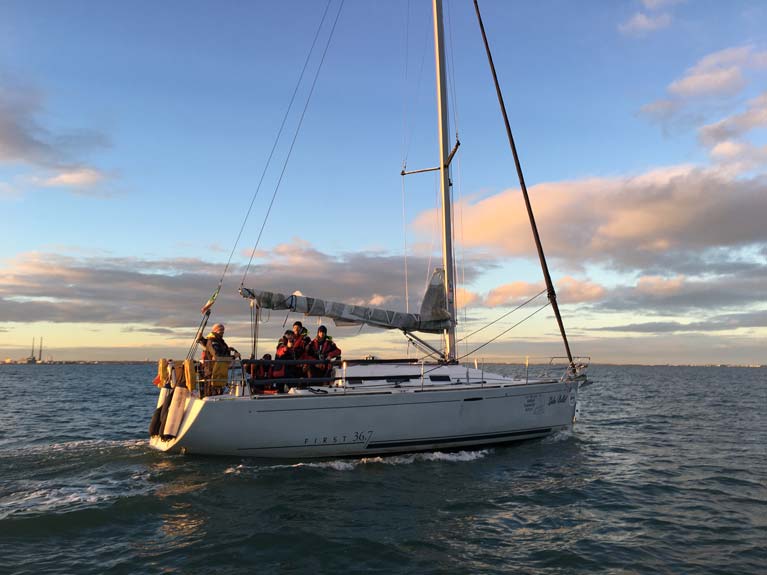 The INSS has put together a two-minute survey to gauge the effect of COVID-19 on foreign charter holiday plans and to see if we can assist the Irish yacht training and charter industry in what will be a difficult year or two
The INSS has put together a two-minute survey to gauge the effect of COVID-19 on foreign charter holiday plans and to see if we can assist the Irish yacht training and charter industry in what will be a difficult year or two
INSS has launched a very short survey examining attitudes to chartering aboard and at home, and want to know what barriers exist to chartering a yacht.
The school’s chief instructor Kenneth Rumball describes their approach. “We know anecdotally that there is less demand for this sort of holiday at home, but we want to understand is there anything that we can do to change this. Ideally, we’d love to work with colleagues in the industry to help keep everyone afloat”.
The team are keen to hear your views, either by online survey or by getting in touch with the team in the office on 01 284 4195 or [email protected].
The survey can be found here
New figures out today from British Marine, the leading trade association for the UK leisure marine industry, highlight how the marine sector has created close to £6bn in sales from boating-related tourism expenditure in 2018, a 65% growth since 2013. In 2018, the average boating and watersport tourist spent just over £47 a day for fun out on the water, an increase from £45.70 in 2013. Londoners and those from the South East, South West and the Midlands spent the most on boating-related tourism.
- Boating related tourism has created 62,200 new jobs in five years.
- Direct boating tourism adds more to the UK economy than film, agriculture, forestry and fishing industries individually.
- The sector has created close to £6bn in sales from boating-related tourism, a 65% growth since 2013.
These boating related tourism sales contributed over £6bn in Gross Value Added (GVA) to the UK economy, a 68% growth since 2013. Of the subsectors within boating tourism,hire, charter and training contributed the most GVA (£132 million) to the UK economy. This can be attributed to increased spending on leisure activities as wealth and disposable incomes rose following the UK’s recovery from the financial crisis.
Direct boating tourism contributes more GVA to the UK economy than other sectors individually including the agriculture, forestry and fishing industry, and motion picture and television programme production.
Britain’s boating tourism sector supports 158,000 jobs across UK leisure, marine and tourism businesses and their supply chains. The industry has created 62,000 more jobs since 2013. For every job directly employed in the boating tourism sector, there are an additional 15 jobs supported in the wider economy through the direct and indirect effects of expenditure of boaters and boating tourism businesses. Employment is the highest in the South East, London, South West and West Midlands. Together, these regions account for over half (54%) of direct and indirect jobs in the British marine sector.
Nigel Hamilton, Chair of British Marine Tourism, said: “Boating related tourism is a very diverse segment of the UK tourism market, reflecting a wide range of budgets, types of craft and holiday experiences. This report illustrates the varied and substantial economic contribution to a thriving UK boating tourism sector gives to local communities across Britain demonstrates the great potential for further industry growth.”
Lesley Robinson, CEO at British Marine, added: “The depreciation of the sterling since the Brexit vote has helped this success by promoting domestic and inbound tourism. As the hire, charter and training markets expand, we look forward to seeing even more people getting out onto the water!”
Boating tourism businesses have enjoyed consistent growth since the EU referendum, benefitting from the increased attraction of UK holidays resulting from a weakened pound. Amongst our members, businesses confidence remains positive, with a net rating score of +16%, an improvement of +3% since the referendum.
#AQUATIC TOURISM – The Aberdeen Asset Management Scottish Traditional Boat Festival has won the Best Cultural Event category in the regional finals of the Scottish Thistle Awards. The awards, organised by Visit Scotland celebrate excellence in the Scottish tourism industry. The annual maritime event will now be shortlisted for the national Scottish Thistle Awards, held in November.
Roger Goodyear, chairman of Aberdeen Asset Management Scottish Traditional Boat Festival says, "Winning this award reflects the hard work and excellent efforts of our team of volunteers who are responsible for making the festival happen each year. With only a few weeks until the 19th annual event, which takes place on June 23 and 24, organisation is in full swing and this year's event is set to be exceptional. The festival will make history by playing host to the biggest ever St Ayles skiff coastal rowing regatta, with teams from the Hebrides to Tyne and Wear taking part. Every year we aim to raise the bar and truly deliver on our promise to be an event offering something for everyone and winning this award is true recognition of this and has provided a real boost to the team behind it.
"We are looking forward to the national awards and it would be fantastic to take this accolade back to Portsoy and share it with the local community, without who's support, the event would not be where it is today."
German Travel Writers Sample Delights of West Cork
#TOURISM - Germany's top travel writers were invited to Cork recently to sample some of the best water-based activities the county has to offer.
As InsideIreland.ie reports, the group followed an itinerary designed by Fáilte Ireland that included seaweed picking by kayak near Skibbereen, a coastal walk along the Seven Heads Peninsula and whale watching off Baltimore.
"Germany is a priority market," said Zoe Redmond of Tourism Ireland, which invited the group to Cork.
“Fact-finding visits like this are very important; they are a really effective way for us to get positive exposure for Ireland through the media in Germany, helping us to showcase the superb tourism product on offer in this part of Ireland to thousands of potential German holidaymakers," she added.
InsideIreland.ie has more on the story HERE.
Cork The Place to Be For a Holiday On The Sea
#TOURISM - Winter might be upon us, but it's a great time to plan a new year holiday in Ireland on the sea, according to the UK's Daily Echo.
From night-time paddling in with renowned kayaking instructor Jim Kennedy, to snorkelling in Baltimore, relaxing in Skibbereen and and fresh seafood lunches in Kinsale, a vacation in Cork can appeal to any taste.
Whale and dolphin watching is a big draw for the region, too, as Ireland's coast – the first cetacean sanctuary in Europe - plays host to a growing variety of species.
The summer feeding grounds off the southern coast are particularly busy, and tourist boats are often treated to whales breaching the surface and surrounded by dolphins putting on a show.
The Daily Echo has more on the story HERE.
Business Brisk in Dun Laoghaire for Charter Yachting Company
#LEARN TO SAIL - Charter yacht trip firm GoSailing.ie is weathering the recession, as the Sunday Business Post reports.
The venture - which provides daily and corporate yacht excursions since setting up in 2000 - reacted to a shortfall in customers due to the changing ecomonic climate by relocating from Westport to Dun Laoghaire marina, where business has been brisk.
Aaron O'Grady, a veteran of the Irish Olympic sailing squad, started the business with his father Pauric, the duo investing in a 54-foot yacht The Explorer to run sailing trips off the Mayo coast, helping novices learn to sail.
They later teamed up with business manager Bref Kennedy, who says that the recreational sailing business has plenty of room to grow.
"Our main goals are trying to break the perception of sailing that pervades in Ireland and also to introduce people to the exciting world of sailing on the extremely under-used and beautiful coastline that exists right on our doorstep," said Kennedy.
GoSailing is also the only company providing a charter yacht service on the east coast, according to Kennedy, which is "amazing considering we are an island nation".
Charter yachting trips around Dublin Bay, Killiney Bay and Dalkey Sound typically go for around €35 a head for groups of 12. For more details visit GoSailing.ie.


























